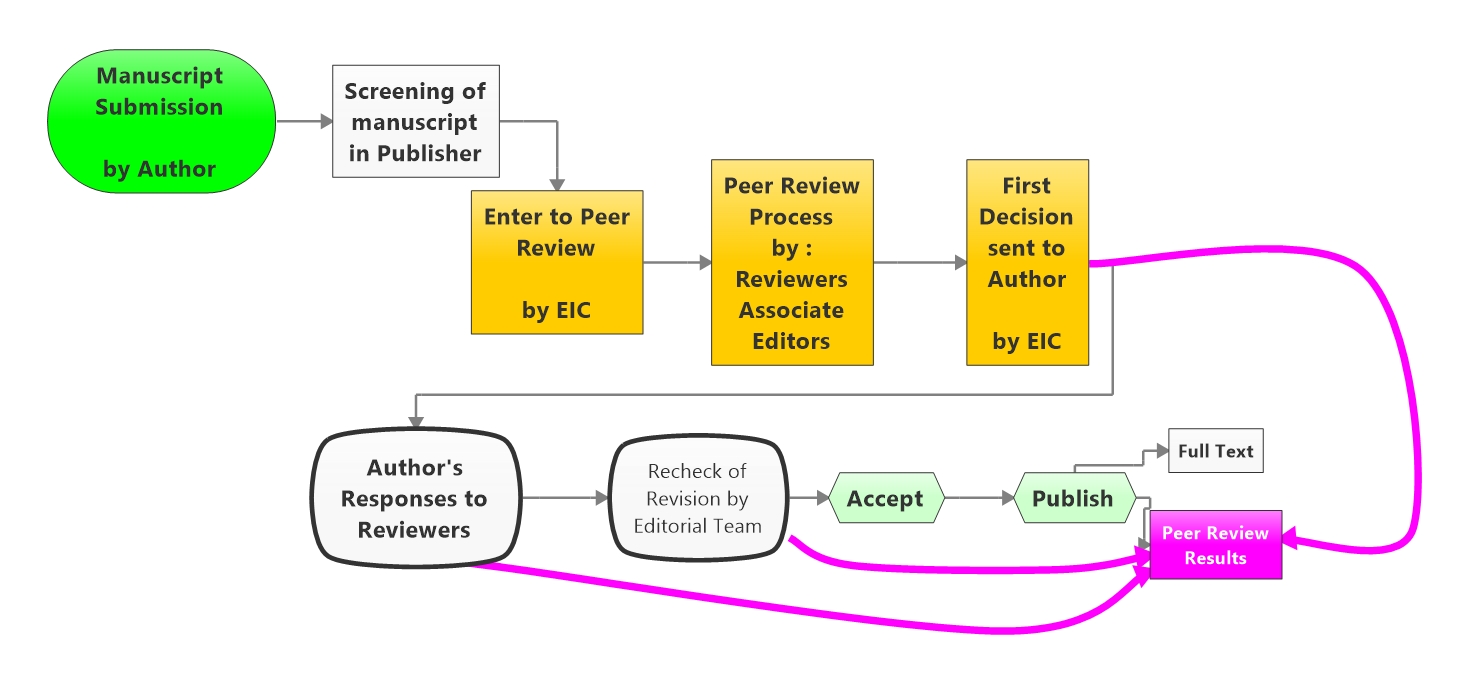"Peer review" as a judgment on an academic work may affect the whole job and life of an educated person and is the utmost goal of managing a journal.
Rules of External Peer Review:
- All submitted manuscripts are subjected to external peer review and editorial approval.
- Articles are sent to at least three independent reviewers in the related field.
- Usually, the reviewers are blinded to the authors' identities and affiliations while the associate editors have full access to them.
- Authors are usually notified within 2-3 months about the acceptability of their manuscripts.
- Reviewers are selected based on their expertise within the topic area of the submission, and their purpose is to assist the authors and the journal by providing a critical review of the manuscript. To be a reviewer in one of the Brieflands journals, please submit your request with your resume at https://brieflands.com/forms/support. The editorial board of the journal will review your resume and will be in contact with you.
- After receiving the reviewers' comments, authors are requested to send the revised article and a copy of their reply to the reviewers, including the comment and explaining the answers to the questions and the changes made to the revised version. Communication regarding a specific manuscript will be done between the journal and the designated corresponding author.
Responsibility for the Reviewers
Based on the agreement with our reviewers, they are committed to these regulations:
- Reviewers should keep all information regarding papers confidential and treat them as privileged information.
- Reviews should be conducted objectively, with no personal criticism of the author. No author's self-knowledge of the author(s) must affect their comments and decisions.
- Reviewers should express their views clearly with supporting arguments in 500 to 1000 words.
- Reviewers may identify relevant published work that the authors have not cited.
- Reviewers should also call to the Editor in Chief's attention any substantial similarity or overlap between the manuscript under consideration with other published articles.
- Reviewers should not review manuscripts in which they have conflicts of interest resulting from competitive, collaborative, or other relationships or connections with the authors, companies, or institutions connected to the papers.
Different Types of Peer Review in Brieflands Journals
There are two types of "Peer Review" among the Brieflands Journals:
- Double-blind Peer Review System: Neither Reviewer nor the author knows each other. In This system, we send a blind PDF to the reviewer, and a reviewer can only see the text of the manuscript without knowing the names or affiliations.
- Open Peer Review: Readers and authors of the manuscript can see and read the reviewer's comments.
We believe that publishing our peer review reports could make a transparent and clear environment for all our efforts within a journal, but not all reviewers tend to post their comments.
Schema of Peer Review Process in Brieflands Journals
Please see the below diagram, which shows the review process.
What is the "Open Peer Review" process?
An "Open Peer Review" process is making the details of all review processes (including reviewers, associate editors, and EICs comments) as "Public" as it is agreed upon by EIC, Authors, and reviewers.
Types of reviewers in Open Peer review
- Signed-Reviewers: These reviewers agree to declare their names and affiliations on the public journal website.
- Anonymous Reviewers: These reviewers are anonymous to the public but known for EIC, while only their comments will be publicly available.
Advantages of the "Open Peer Review" process
- More transparency, constructiveness, and tactful comments in the peer review process: lead to an increase in the quality of reviews
- More motivations for all involved roles in the review process
- Authors' satisfaction from the review process: Increases honesty between authors and reviewers
- Education of both authors and new students
- It prevents reviewers from following their agendas and leads to the detection of reviewers' conflicts of interest.
The "Open Peer Review" project was started on 1 Sep 2019 in all Brieflands journals.
A model of the Peer Review process and contents of the Open Peer Review Report
Here you may find a sample model of the open peer review process in Brieflands journals.

